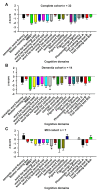Long-Term Course of Neural Autoantibody-Associated Psychiatric Disorders: Retrospective Data from a Specifically Immunopsychiatric Outpatient Clinic
- PMID: 37218900
- PMCID: PMC10204564
- DOI: 10.3390/antib12020034
Long-Term Course of Neural Autoantibody-Associated Psychiatric Disorders: Retrospective Data from a Specifically Immunopsychiatric Outpatient Clinic
Abstract
Background: Autoantibody-associated psychiatric disorders are a new terrain that is currently underrepresented considering immunopsychiatry's potential importance for therapeutic aspects. The aim of our research was thus to present initial pilot data on the long-term clinical course of our patients in an outpatient clinic specializing in autoantibody-associated psychiatric disorders. Methods: Thirty-seven patients were examined clinically in our outpatient clinic at regular intervals over a 1.5-year period. We collected clinical data on their demographics, psychopathology, and cognition, and magnetic resonance imaging (MRI) and cerebrospinal fluid (CSF) data as well as the status of neural autoantibodies in blood and/or serum. Results: Our main finding was that affective, psychotic, and cognitive symptoms did not change significantly over the 1.5-year period, thus revealing no progression. We divided the entire cohort of autoantibody-positive patients (n = 32) into subgroups consisting of patients with dementia (n = 14), mild cognitive impairment (MCI) (n = 7), psychotic disorders (n = 6), and a CSF profile of Alzheimer's disease (n = 6). Relying on established classification schemes, we identified the following percentages in our autoantibody-positive cohort: 28% with autoimmune encephalitis, 15% with autoimmune psychosis, and 63% with autoimmune psychiatric syndromes. Discussion: These initial pilot results suggest that autoantibody-associated diseases do not show a significantly progressive course in the long-term and are often characterized by impaired verbal memory recall when cognitive impairment progresses to dementia. These initial data need to be verified in larger cohorts. We believe that this pilot study underscores the importance of promoting such a specialized outpatient clinic to better characterize various aspects of autoantibody-mediated psychiatric disorders.
Keywords: neural autoantibody; outpatients; psychiatry.
Conflict of interest statement
The authors declare no conflict of interest.
Figures

Similar articles
-
Cerebrospinal Fluid Total Tau Protein Correlates With Longitudinal, Progressing Cognitive Dysfunction in Anti-Neural Autoantibody-Associated Dementia and Alzheimer's Dementia: A Case-Control Study.Front Immunol. 2022 Mar 3;13:837376. doi: 10.3389/fimmu.2022.837376. eCollection 2022. Front Immunol. 2022. PMID: 35309366 Free PMC article.
-
Prevalence of Anti-neural Autoantibodies in a Psychiatric Patient Cohort-Paradigmatic Application of Criteria for Autoimmune-Based Psychiatric Syndromes.Front Psychiatry. 2022 May 30;13:864769. doi: 10.3389/fpsyt.2022.864769. eCollection 2022. Front Psychiatry. 2022. PMID: 35711589 Free PMC article.
-
Biomarkers of neurodegeneration in neural autoantibody-associated psychiatric syndromes: A retrospective cohort study.J Transl Autoimmun. 2022 Oct 5;5:100169. doi: 10.1016/j.jtauto.2022.100169. eCollection 2022. J Transl Autoimmun. 2022. PMID: 36238527 Free PMC article.
-
Immunotherapy in Autoantibody-Associated Psychiatric Syndromes in Adults.Front Psychiatry. 2021 Jan 28;12:611346. doi: 10.3389/fpsyt.2021.611346. eCollection 2021. Front Psychiatry. 2021. PMID: 33584385 Free PMC article. Review.
-
Autoimmune encephalitis with psychiatric features in adults: historical evolution and prospective challenge.J Neural Transm (Vienna). 2021 Jan;128(1):1-14. doi: 10.1007/s00702-020-02258-z. Epub 2020 Oct 7. J Neural Transm (Vienna). 2021. PMID: 33026492 Free PMC article. Review.
Cited by
-
Possible roles of neuropeptide/transmitter and autoantibody modulation in emotional problems and aggression.Front Psychiatry. 2024 Sep 24;15:1419574. doi: 10.3389/fpsyt.2024.1419574. eCollection 2024. Front Psychiatry. 2024. PMID: 39381606 Free PMC article. Review.
References
-
- Jeppesen R., Nilsson A.C., Sørensen N.V., Orlovska-Waast S., Christensen R.H.B., Benros M.E. Antineuronal antibodies in cerebrospinal fluid and serum of 104 patients with psychotic disorders compared to 104 individually matched healthy controls. Schizophr. Res. 2023;252:39–45. doi: 10.1016/j.schres.2022.12.029. - DOI - PubMed
-
- Hansen N., Lipp M., Vogelgsang J., Vukovich R., Zindler T., Luedecke D., Gingele S., Malchow B., Frieling H., Kühn S., et al. Autoantibody-associated psychiatric symptoms and syndromes in adults: A narrative review and proposed diagnostic approach. Brain Behav. Immun. Health. 2020;9:100154. doi: 10.1016/j.bbih.2020.100154. - DOI - PMC - PubMed
-
- Runge K., Reisert M., Feige B., Nickel K., Urbach H., Venhoff N., Tzschach A., Schiele M.A., Hannibal L., Prüss H., et al. Deep clinical phenotyping of patients with obsessive-compulsive disorder: An approach towards detection of organic causes and first results. Transl. Psychiatry. 2023;13:83. doi: 10.1038/s41398-023-02368-8. - DOI - PMC - PubMed
LinkOut - more resources
Full Text Sources

